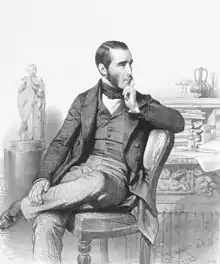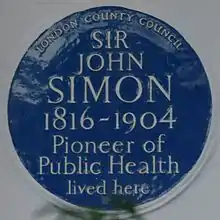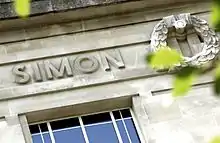John Simon (pathologist)
Sir John Simon KCB FRS FRCS (10 October 1816 – 23 July 1904) was an English pathologist, surgeon and public health officer. He was the first Chief Medical Officer for Her Majesty's Government from 1855–1876.
Sir John Simon | |
|---|---|
 Lithograph of John Simon by Charles Baugniet (1848) | |
| Born | 10 October 1816 |
| Died | 23 July 1904 |
| Occupation | Chief Medical Officer |
| Signature | |
 | |
_1881.jpg.webp)

Biography
John Simon was born in London to Louis Michael Simon, a stockbroker, and Mathilde (née Nonnet).[1] He was the sixth of Louis' fourteen children by two marriages.[2] His medical career began in 1833 when he became an apprentice to surgeon Joseph Henry Green and he was educated at King's College and St Thomas' Hospital in London.[1][2] In 1838 he became a member of the Royal College of Surgeons.[3] In 1845 he won the Astley Cooper Prize for an essay entitled "Physiological Essay on the Thymus Gland"; he was elected as a Fellow of the Royal Society (FRS) the same year.[1]
In the mid-19th century, the government took measures to promote public health; the Public Health Act 1848 was passed and a General Board of Health was created. The same year, Simon was appointed the Medical Officer of Health for London for the City of London's commission of sewers; this was only the second health officer appointment in the country (William Henry Duncan had become Medical Officer for Health in Liverpool the previous year).[1][3] He served in this position until 1855. The General Board of Health was reorganised in 1853, and Simon became the board's Chief Medical Officer in 1855.[1][4] The General Board only lasted until 1858; on its dissolution, Simon's role as Chief Medical Officer transferred to the Privy Council.[4]
From 1867 to 1869 he was President of the Pathological Society of London.[5]
He married, in 1848, Jane O´Meara, daughter of Deputy Commissioner-General Matthew Delaval O´Meara. Lady Simon died aged 85 in London 19 August 1901.[6]
Simon died on 23 July 1904 in London and was buried at Ladywell Cemetery in Lewisham.[1]
Recognition

Simon's name features on the Frieze of the London School of Hygiene & Tropical Medicine. Twenty-three names of public health and tropical medicine pioneers were chosen to feature on the School building in Keppel Street when it was constructed in 1926.[7]
References
- Footnotes
- Hamlin, Christopher (2004). "Simon, Sir John (1816–1904)". Oxford Dictionary of National Biography (online ed.). Oxford University Press. doi:10.1093/ref:odnb/36097. Retrieved 12 October 2011. (Subscription or UK public library membership required.)
- "Simon, Sir John (1816–1904)", Catalogues of the Surgeon General's Library, Royal College of Surgeons, 2006, retrieved 12 October 2011
- Schneider, p. 193
- Clay, p. 32
- "Transactions of the Pathological Society". Retrieved 27 October 2012.
- "Obituary". The Times (36539). London. 21 August 1901. p. 8.
- "Behind the Frieze". Retrieved 21 February 2017.
- Sources
- Clay, Henry Hurrell; Bassett, W. H. (1999), Clay's Handbook of Environmental Health, Taylor & Francis, ISBN 0-419-22960-4
- Schneider, Dona (2008), Public Health: The Development of a Discipline, Volume 1, Rutgers University Press, ISBN 978-0-8135-4232-4
Further reading
External links
| Wikimedia Commons has media related to John Simon (pathologist). |
- Chisholm, Hugh, ed. (1911). . Encyclopædia Britannica (11th ed.). Cambridge University Press.
- Sir John Simon